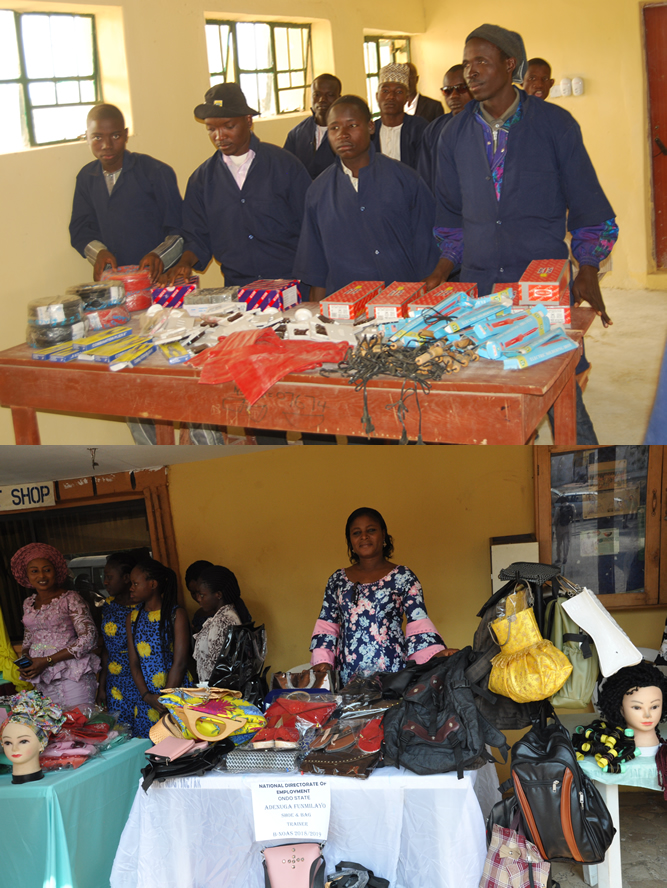Program Departments
Overview
- The declining interest of youths in the agricultural sector which had traditionally provided the bulk of employment, particularly in the rural areas.
- The deteriorating condition of urban and rural infrastructure due to the dearth of foreign exchange earnings to procure and maintain construction machinery and equipment as against the surplus labour (unemployed hands) available in the country.
- The tertiary institutions graduates’ expectation for non-existent white collar jobs and accompanying employment while their background do not prepare them to take advantage of the opportunities for self-employment in the formal and informal sectors of the economy.
- The potentials of the informal sector and the traditional apprenticeship system of skills acquisition to generate self - employment.
- The need to counsel the unemployed for attitudinal re-orientation towards self-employment and self-reliance.
In recognition of the foregoing factors and the distinct target group (unemployed school leavers and graduates), the National Directorate of Employment adopted the following areas of intervention which make up the four core programmes:
4-Core Program Departments of NDE

Vocational Skills Development
VOCATIONAL SKILLS DEVELOPMENT (VSD)
The Vocational Skills Development programme is one of the Directorate’s job creation programmes primarily concerned with imparting productive, functional, and marketable skills for unemployed persons in the country. The main aim of the Vocational Skills Development programme is to provide technical and vocational skills training for unskilled, unemployed Nigerians to become self-reliant.
The programme involves using NDE Skills Acquisition Training Centres and informal sector operators such as master craftsmen and women as training outlets for unskilled persons. Where the informal sector operators are used, the trainees are attached to them for a period long enough for the apprentices to acquire the necessary skills.
The Department also deploys well-equipped Mobile Training Workshops (MTWs) to train unemployed persons in rural areas where informal training outlets are deficient or non-existent. To date, the vocational skills training covers over 80 skill sets. The target populations for the programmes are persons without formal education, school leavers, school dropouts, persons with special needs and, Fresh graduates from tertiary institutions who desire to acquire functional and marketable skills.
SCHEMES UNDER VOCATIONAL SKILLS DEPARTMENT
The National Open Apprenticeship Scheme is targeted at unskilled and unemployed persons both male and female to equip and up-skill them with relevant demand-driven skills. The scheme is implemented at two (2) levels namely:
- Basic- National Open Apprenticeship Scheme (B-NOAS)
- Advanced-National Open Apprenticeship Scheme (A-NOAS)
The Basic National Open Apprenticeship Scheme (B-NOAS) is a scheme through which unemployed persons are recruited and posted to Master craftsmen/women in both skills centres and the informal sector operators to acquire marketable vocational skills to be self-employed and for decent job opportunities. The Trainers impart skills to the trainees using training facilities in their workshops.
Advanced- National Open Apprenticeship Scheme (A-NOAS)
Advanced National Open Apprenticeship Scheme [A-NOAS] is designed for Artisans who were graduates of the B -NOAS. The scheme is designed to bridge the skills gaps and upgrade the skills of the benefiting persons who are in business (i.e. equip them with a higher level of competence).
The School-On-Wheels Scheme is designed to extend skills acquisition training activities to unemployed persons in rural areas. The scheme deploys well-equipped Mobile Training Workshops (MTWs) stocked with vocational skills training facilities to rural areas where training outlets are deficient or non-existent. Skills training under this scheme last for a minimum of three months and is aimed at creating a pool of Artisans that will readily address the needs of the rural environment, promote economic activities and stem the tide of rural-urban drift.
The Community Based Training Scheme (CBTS) is aimed at training unemployed persons in high-income generating activities within their various localities. Participants are trained in such skills that bridge the existing skills gap in the provision of services in the community as well as improving the livelihood of the people.
Quick-Fix Training
In a bid to ensure that the job creation mandate of the NDE is achieved through vocational skills acquisition training, the Department designed Quick-Fix Training in demand-driven skill sets for unemployed persons, especially youths and women. These are skills that have a short-term learning duration (4 weeks) but are quickly essential for societal survival.
QUICK FIX TRAINING ON SMALL CHOPS
Youths Transformation Training Scheme in Technical and Vocational Skills (YOTECSS)
The Youth Transformation Training Scheme in Technical and Vocational Skills (YOTECSS) was designed as a result of the growing demands for modern specialized technical skills to sharpen and broaden the youths’ (trainees) capabilities in high-income generating technical and vocational economic engagements. YOTECSS gives participants (trainees) the skills to live, learn and work as productive citizens in a global society; and to remain in tune with national development through changing social values. It was also fashioned to keep the youths abreast of technological advancement and the increasingly competitive international market.
The resettlement scheme is designed to assist graduates of all VSD training Schemes with tools/equipment and working capital to enable them to establish and run their businesses successfully.

Small Scale Enterprises
SMALL SCALE ENTERPRISES (SSE)
The Small-Scale Enterprises (SSE) programme is one of the four core programmes departments of the NDE designed to inculcate into the unemployed Nigerians (graduates, artisans, women, vulnerable, physically challenged and retirees) and other interested persons, the spirit of entrepreneurship, creativity and self-reliance to assist them in business set-ups for self-employment.
The programme is geared at sensitization of unemployed to become self-reliant, support business start-ups with trainings and loan facilities, and upgrading of small scale business for improved growth.
SCHEMES UNDER SMALL SCALE ENTERPRISES (SSE)
The Start Your Own Business (SYOB) is a training and resettlement programme aimed at building self-reliant entrepreneurs amongst young graduates. The training assists beneficiaries in business startups for self-employment.
The Entrepreneurship Development Programme is a collaborative effort between the NDE and the National Youth Service Corps (NYSC). The EDP is organized for Youth Corps members while undergoing the mandatory orientation at their NYSC camps. The training is meant to sensitize them on available opportunities for self-employment and how they can access loans for starting up their own businesses after their service year.
The MPP focuses on empowering matured persons especially retirees from both public and private service to establish their own businesses, add to their source of income, increase their wealth and generate jobs.
The Basic Business Empowerment is a scheme designed to equip beneficiaries with startup capital for self-employment.
The Micro Enterprise Enhancement Scheme (MEES) is a loan scheme designed to boost micro businesses. Funds from MEES are channeled to upgrading tools/equipment of beneficiaries and assist in restocking their stores to enable them compete favorably in the business environment.
The Women Employment Branch was established to equip women with basic skills that help them generate income, create wealth, and become self-reliant in their communities. These skills include; fashion design, Crochet Making, Make-Up, Tye and Dye, Event Planning, Hair Wig/Turban, Spice Production, Stone/Bead/ Perfumery, Etc.

Rural Employment Promotion
RURAL EMPLOYMENT PROMOTION (REP)
The Small-Scale Enterprises (SSE) programme is one of the four core programmes departments of the NDE designed to inculcate into the unemployed Nigerians (graduates, artisans, women, vulnerable, physically challenged and retirees) and other interested persons, the spirit of entrepreneurship, creativity and self-reliance to assist them in business set-ups for self-employment.
The programme is geared at sensitization of unemployed to become self-reliant, support business start-ups with trainings and loan facilities, and upgrading of small scale business for improved growth.
SCHEMES UNDER RURAL EMPLOYMENT PROMOTION (REP)
The scheme is designed to train unemployed youth and women on the potentials of organic agriculture as an income generating activity for self-employment.
The Community-Based Agricultural Empowerment Scheme (CBAES) is designed to empower NDE trained beneficiaries who are in cooperatives within their communities to engage in businesses in which they have comparative advantages.
SADES is the resettlement scheme for graduate trainees of the Sustainable Agricultural Development Training Scheme (SADTS). The loan facility enables them engage in agribusinesses along its value chain.
The Sustainable Agricultural Development Training Scheme (SADTS) was created to impact sustainable innovative agricultural skills along its value chain to unemployed youth with a passion for agriculture. This laudable scheme encompasses an agricultural production and distribution system that provides more profitable farm income, promotes environmental stewardship and enhances the quality of life of farm families and their communities.
The Post-SADTS is a specialized one-week advanced training for graduate trainees of SADTS. The scheme utilizes the KASH (Knowledge, Attitude, Skill, and Habit) model to transform youth for the desired impact. This training is aimed at instilling an Agriculture-based KASH model in the beneficiaries, emphasizing personal development over monetary gain (CASH).
In Nigeria goat production is an economically viable business venture because its value chain for commercial production. The Training is designed to impart techniques of goat production and its value chain to unemployed youths. Community-Based Agricultural Training Scheme (CBATS)
The Scheme employs the block farming model to equip participants with agricultural skills, focusing on innovative cereal production and its value chain.

SPECIAL PUBLIC WORKS
SPECIAL PUBLIC WORKS (SPW)
i. Interns are placed on pupilage to serve an attachment period to Government Agencies and corporate organisations for a specified period.
ii. Unemployed graduates are engaged as coaches in remedial study centres.
SCHEMES UNDER SPECIAL PUBLIC WORKS (SPW)
The Graduate Attachment Programme (GAP) aims to combat graduate unemployment by providing temporary jobs for unemployed graduates who have completed the mandatory National Youth Service Corps (NYSC). Participants are attached to willing corporate organizations for 3-6 months, allowing them to develop specific skills, gain practical experience, and enhance employability. The goal of GAP is to give participants a competitive edge, increasing their chances of retention by allowing employers to fully assess their job potential.
The Environmental Beautification Training Scheme (EBTS) aims to equip unemployed youths and interested individuals with skills in Hard Landscaping, Soft Landscaping, and Plaster of Paris (POP) application. This scheme not only promotes environmental beautification and erosion control but also offers protection. The training lasts for a period of three months.
The Scheme targets unemployed artisans and those seeking to upgrade their skills. The scheme aims to create a more reliable workforce by enhancing and up-skilling artisans to meet industry standards and instill professionalism. Artisans are attached to construction companies for three months to gain on-the-job exposure and experience.
The Enviropreneurship Development Scheme focuses on solving environmental problems while meeting societal and economic objectives. It encourages turning waste into valuable resources within societal and regulatory norms, promoting environmental sustainability, and social contribution. The scheme increases socio-economic activities, generates employment, encourages wealth creation, and supports poverty reduction.
The Community-Based Business Training Scheme is designed for community involvement. It enhances understanding of business phenomena and translates knowledge into action, focusing on socially and environmentally responsible businesses that reinvest in the community. This training connects business concepts to personal experiences, improving knowledge retention, skill acquisition, and real-life application.
The Community Development Scheme (CDS), also known as Labour-Based Infrastructure Development Scheme (LBDS), facilitates community-based infrastructural development in construction, rehabilitation, maintenance, and environmental protection works. It engages and utilizes unemployed skilled and unskilled members of host communities temporarily, providing them with opportunities to acquire new skills and trade experiences.
